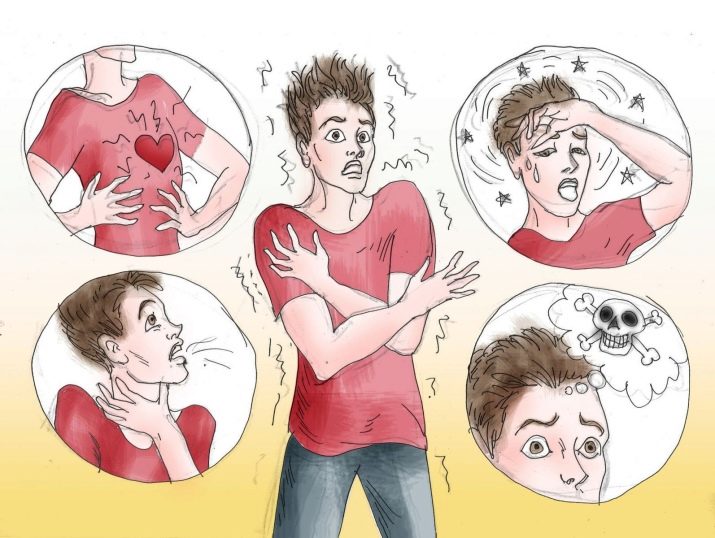If you are not afraid of reading the word hippo monstrosesquipedaliophobia, then, fortunately, this unusual and strange disease has passed you. Its name is a kind of test to identify the phobia that every 20th inhabitant of the Earth experiences. This is one of the most surprising phobias - the fear of long words. There is also a shorter, synonymous name for this phobia - seskippedalophobia.

What is the essence of seskippedalophobia?
The disease is caused by an object or event recorded by the amygdala of the hippocampus, as a dangerous or even fatal phenomenon. Further, the human body reacts as if the same phenomenon is inevitably repeated. A patient with a severe form of the disease is, as they say, captured in his feelings of anxiety and panic, which he experiences when he thinks or in the form of words “dangerous” to him.
In the list of numerous phobias, seskippedalophobia takes place mild psychological disorder, representing a fear of irrational origin in front of long words.
With an upset, some people are not only afraid to read, but they are afraid to think or hear such letter combinations.

Hence the desire to use short sayings in communication, to concisely state your thoughts. Respectively, for thinking sick, the search for short words and phrases is an additional burden, often reinforcing the fear of error and the consequences of the disease.
The severity of the disease and the quality of its manifestations are different and often acquire individual characteristics.Some people are afraid of long, large words and their combinations, the meaning of which they do not always understand. Others begin to feel anxiety and fear when trying to use well-known, not particularly long words.

Differences in terms of the consequences of the disease are determined not only by the individual characteristics of the patient’s personality, but also by the scope of his professional activity.
If a person is a professional teacher, and his training course is replete with various terms, then this leads to serious difficulties in his work, down to the desire to change his profession. The situation is similar with workers in the medical field, where there are many complex and long terms.
Causes of the disease
The main causes of the disease include the occurrence of traumatic situations of various kinds, which, appearing once, can be fixed in the mind. Gradually problematic situations become phobias, significantly worsening the quality of human life in almost all of its spheres.
Often, the patient is afraid of reactions from the environment to the fact that he makes mistakes in the pronunciation of certain long words. Typically, this fear is characteristic of adolescents who are especially vulnerable to their peers and close circle.

The arising feelings of shame and anxiety injure and deform the psyche of children, negatively affecting their school performance.
The child becomes closed, experiencing his shortcomings, he often with irritation perceives the teacher's questions and refuses to answer at the blackboard. Often conflicts arise in which the child cannot explain the real reason for his behavior.
The causes of the disease can be:
- self-doubt;
- bad experience of the past;
- a high degree of dependence on the opinions of others;
- traumatic situations experienced in the past (especially in childhood);
- constant mockery of the child;
- fear of losing social status;
- biological aspects (in some cases, the disease may be due to heredity and other reasons, for example, with stuttering);
- fear of becoming ridiculous in the eyes of the environment.

The patient significantly increases the level of anxiety, he becomes suspicious and insecure.
Constantly experiencing internal complexes, the patient becomes extremely dependent on the judgments - even erroneous - of the people around him. Gradually, with the course of the disease, the patient is increasingly visited by thoughts of his incompetence and lack of proper professionalism. The inferiority complex begins to dominate.

Signs and symptoms of the disease
The desire to avoid a potentially dangerous situation becomes habitual for the patient and leaves an imprint on all his behavior. Hearing complex verbal constructions, he experiences bouts of inexplicable fear. At the somatic level, the disease makes itself felt:
- panic attacks;
- the occurrence of shortness of breath and sweating;
- rapid heartbeat;
- fainting
- a feeling of tremor of the hands and dry mouth;
- dilated pupils;
- discoloration of the skin;
- the occurrence of nausea, headache, difficulty breathing.
Embarrassed by his awkwardness, the patient loses the ability to think rationally, feeling the all-consuming impotence and inability to master the traumatic situation.

Aware of the irrationality of the phobia, he is not aware of the fact that the disease is harmless and successfully treated.
With hippopotomonstrosescipedalophobia, the intellectual level of a person does not decrease. Individuals, independently analyzing their fears, courageously and successfully overcome this unpleasant disease. Others need professional help.
What is dangerous phobia?
Often, faced with such a problem, patients believe that the best way out of the traumatic situation is to exclude words that are “dangerous” to them. However, such a situation only exacerbates the situation, as inferiority complexes begin to develop, depressive states, neuroses occur, and the disease continues to progress.
Such conditions are especially dangerous for children. Lack of timely treatment can lead to the expulsion of the child from school due to poor performance.
A feature of the disease is that it very quickly progresses to an active form of development.

Activation of the disease leads to the fact that the patient to a large extent loses the ability to self-control, sometimes unexpectedly and in completely inappropriate places for this.
The need to regularly overcome exhausting panic attacks, nausea and headaches exhaust the psyche and lead the body to physical exhaustion. This provokes the occurrence of chronic diseases of a somatic nature, blood pressure rises, human organs cease to function normally.
Potentially the phobia of long words can lead to the emergence of other phobias, complicating the overall picture of the disease with the emergence of new objects of fear.

How to treat?
As a mild mental form of the disorder, hippopotomonstrosescippedalophobia is dangerous for its consequences, especially in the absence of timely and qualified treatment.
Medications in this case, as a rule, are not used. However, in advanced and severe cases, as a means of relieving exacerbations, can be used:
- tranquilizers: tenoten, afobazole, trioxazine, phenazepam;
- antidepressants: autorix, reboxetine;
- hypnotics: zolpidem, relaxson;
- antipsychotics: eglonyl, chlorpromazine, clopixol.
Self-treatment without medical supervision can lead to unpredictable consequences that cause serious disorders.

Since these drugs have a considerable amount of side effects.
In the absence of any complications, several sessions of psychotherapy are quite enough. The most popular practices among specialists today are as follows.
- Psychotherapy - Reasons for the appearance of fear are revealed. Then they are worked out at a deep subconscious level.
- Psychocorrection involves modeling special situations, overcoming which the patient gets rid of the disease.
- Hypnosis involves the introduction of the patient into a trance state, in which the therapist fixes the installation on the patient’s correct reaction to irritating objects.
- Autotraining consists in regular autogenic training that reduces the level of stress on the patient. It is used as an auxiliary course to other treatment methods.

The self-healing algorithm (for mild forms of the disease) includes:
- identification of the prerequisites and causes of the disease;
- the implementation of a set of exercises to pronounce “dangerous” words according to the “from simple to complex” system, gradually;
- active training under the guidance of an experienced speech therapist on the pronunciation of tongue twisters.
The process of stable memorization of tongue twisters and expressions should be observed constantly and daily, including using a mirror. This significantly enhances the patient’s self-confidence, developing the necessary automatism in the pronunciation of “dangerous” phrases.
Improvised reports in the presence of their relatives and close friends lead to overcoming the disease.

Moreover, stable expressions must be pronounced without errors. Do not try to speak at a fast pace, pronunciation of phrases should be clear and correct.
Hippopotomononstrosesquipedaliophobia is not a sentence, the disease can be completely overcome on its own, having previously and timely secured the support of qualified specialists.
About 10 unusual phobias, see below.










